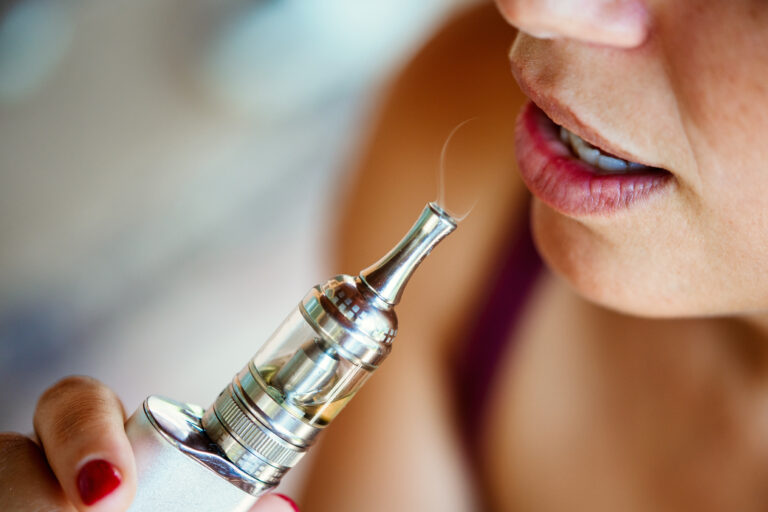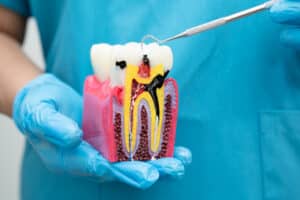Board-Certified Dentist Reveals the Truth About Vaping
Did you know that according to the CDC, more than 1.63 million U.S. middle and high school students reported using e-cigarettes in 2024?
As Board-Certified dentists in Harrisburg, PA, this statistic is alarming, especially considering the potential impact on oral health.
Today, let’s dive into a question I often hear from teens and concerned parents: “Can a dentist tell if you vape?”
How Can a Dentist Tell If You Vape?
As your oral health partner, it’s important to understand that while there’s no definitive test to determine if someone vapes, there are several tell-tale signs that we dentists look for during routine check-ups.
Visual Indicators
- Teeth Staining: Vaping can lead to yellowish or brownish discoloration of teeth. The propylene glycol in e-cigarettes can stick to tooth enamel, attracting staining compounds and causing discoloration over time. This staining may be particularly noticeable on the front teeth and can be different from typical coffee or tea stains.
- Dry Mouth: E-cigarette use often results in reduced saliva production. Saliva plays a crucial role in maintaining oral health by neutralizing acids and washing away bacteria. When we notice consistently dry oral tissues or increased thirst, it could be a sign of vaping. This dryness can also lead to a sticky or tacky feeling in the mouth.
- Inflamed Gums: Nicotine can cause gum irritation and inflammation. We might observe redness, swelling, or tenderness in the gums, particularly in areas where the vapor frequently comes into contact with the oral tissues. This inflammation can mimic the early stages of gum disease.
Oral Health Changes
- Increased Cavities: Dry mouth from vaping can lead to a higher risk of tooth decay. With reduced saliva, bacteria can proliferate more easily, and acids aren’t neutralized as effectively. We might notice an unusual pattern or increased frequency of cavities, especially in areas that are typically less prone to decay.
- Gum Recession: Nicotine can affect gum health, potentially causing gum recession. This appears as the gum line pulling back, exposing more of the tooth root. It’s often more noticeable in the areas where vape aerosol frequently contacts the gums, such as the front teeth or on one side of the mouth.
- Unusual Lesions: Vaping may contribute to the development of oral lesions. These could appear as white or red patches, sores, or areas of irritation in the mouth. While not exclusive to vaping, unexplained lesions, especially in younger patients, might raise suspicion of e-cigarette use.
While these signs might suggest vaping, it’s crucial to note that they could also be caused by other factors. As healthcare professionals, we consider the overall oral health picture, not just isolated symptoms.
Is Vaping Bad for Your Teeth?
The short answer is yes. Vaping can have significant negative effects on your oral health.
Let’s break down some of the key concerns:
Negative Effects of Vaping on Oral Health
- Dry Mouth: E-cigarettes can reduce saliva production, leading to a higher risk of cavities and bad breath. Saliva helps wash away food particles and neutralize acids in the mouth. Without adequate saliva, bacteria can thrive, leading to tooth decay and halitosis. Patients might notice increased thirst, difficulty swallowing, or a persistent sticky feeling in their mouth.
- Gum Inflammation: The chemicals in vape juice can irritate gum tissue, potentially leading to periodontal disease. This irritation can cause the gums to become red, swollen, and more prone to bleeding during brushing or flossing. Over time, this chronic inflammation can progress to more severe forms of gum disease, potentially leading to tooth loss if left untreated.
- Teeth Grinding: Nicotine is a stimulant that can increase teeth grinding, leading to worn enamel and jaw pain. This habit, also known as bruxism, can cause headaches, facial pain, and even cracked or chipped teeth. We might notice unusual wear patterns on the teeth or complaints of jaw soreness, especially in the morning.
- Cell Death: Studies have shown that vaping can lead to increased cell death in oral tissue, potentially slowing healing after dental procedures. This means that recovery from dental work like extractions or gum treatments might take longer for people who vape. It could also make the mouth more susceptible to infections and other complications.
Vaping Side Effects on Oral Health
Beyond the immediate effects, long-term vaping can lead to more serious oral health issues:
- Increased Risk of Oral Cancer: While research is ongoing, some studies suggest a potential link between vaping and oral cancer. The chemicals in e-cigarettes, including formaldehyde and acetaldehyde, are known carcinogens. Long-term exposure to these substances may increase the risk of developing oral or throat cancer. Regular dental check-ups are crucial for early detection of any suspicious changes in oral tissues.
- Compromised Immune Response: Vaping may weaken your mouth’s ability to fight off bacteria, increasing the risk of infections. The chemicals in e-cigarettes can disrupt the balance of beneficial bacteria in the mouth and impair immune cell function. This could lead to more frequent or persistent oral infections, including thrush or periodontal infections.
- Delayed Healing: If you need oral surgery or even just routine dental work, vaping can slow down the healing process. The nicotine in e-cigarettes constricts blood vessels, reducing blood flow to the gums and other oral tissues. This decreased blood flow means less oxygen and fewer nutrients reach the healing areas, potentially leading to complications or prolonged recovery times after dental procedures.
Why It’s Important to Be Honest with Your Dentist
You might be wondering, “If dentists can tell if I vape, why should I tell them?” As your oral health partner, we encourage open communication for several reasons:
- Tailored Care: Knowing about your vaping habits allows us to provide more targeted preventive care and treatment. We can recommend specific oral hygiene products, such as special mouthwashes for dry mouth or high-fluoride toothpaste to combat increased cavity risk. We might also suggest more frequent cleanings or check-ups to monitor for vaping-related issues.
- Early Intervention: We can keep a closer eye on potential vaping-related issues and address them early. For instance, if we know you vape, we might perform more thorough oral cancer screenings or take additional x-rays to check for hidden decay. Catching problems early often means simpler, less invasive treatments.
- Education: We can provide specific advice on minimizing the oral health impacts of vaping. This might include demonstrating proper brushing techniques for stain removal, recommending sugar-free gum to stimulate saliva production, or discussing strategies to reduce vaping frequency. We can also provide information on smoking cessation programs if you’re interested in quitting.
Remember, our goal is to help you maintain optimal oral health, not to judge your choices.
Your Oral Health Matters
So, can a dentist tell if you vape?
While there are signs we might notice, the most important thing is open communication between you and your dental care provider.
At Verber Dental East, we’re here to support your oral health journey.
Your smile is important to us, and we’re here to help you keep it healthy and bright.
If you have any questions or concerns about vaping or any other oral health topics, don’t hesitate to contact us today to schedule your consultation.




